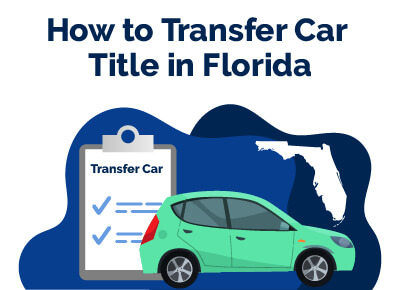How To Transfer Car Title in Florida
July 22, 2023


Chris is Head of Content for FindTheBestCarPrice and is based out of Philadelphia, PA. As a seasoned automotive industry analyst and car enthusiast, he ensures the highest level of quality across all our content and curates our picks for the best deals each month.
Chris studied information systems and marketing at Drexel University and writes about a wide range of topics ranging from car buying tips to troubleshooting common mechanical issues.
When he’s not thinking about cars, he likes to stay in with his dog and make an “attempt” to finish a crossword puzzle (he’s not quite at the Saturday/Sunday level…yet). As a former cheesemonger, Chris still has a “sharp” passion for all things cheese, and his fridge is always loaded with it!
Chris also has a passion for things that go fast, and drones are no exception. He spends some of his time writing for Dronesourced.
If you're buying or selling a car in Florida, knowing how to transfer the car title is crucial. This process legally documents the ownership change.
To transfer a car title in Florida, sellers need to visit a motor vehicle service center to start the application, complete required forms, and provide details like the odometer reading, sale price, and sale date.
All necessary paperwork and signatures are handled at the motor vehicle service center.
It's important to be familiar with Florida's title transfer laws, which cover everything from what needs to be done before selling a car to how to advertise it.
This guide will explain how to transfer a car title in Florida, covering all the essential steps.
Table of Contents
Can You Transfer a Car Title Online in Florida?
No. You cannot transfer a car title online in Florida. Florida has strict title transfer laws that mandate the buyer and the seller to be present at any motor vehicle service center near them to proceed with the application and completion of transferring their titles.
This provision is also applicable even if the seller has an electronic title. All parties involved must visit a motor vehicle service center, complete a secure title reassignment with the HSMV 82994 or 82092 forms, and disclose their odometer readings.
You must understand that even third-party websites like eTags, owned by private agencies and have no affiliation with the Florida Government, cannot and will not carry out an online transfer for you in Florida. You will need to visit any Florida Department of Motor Vehicles (DMV) offices near you to do this.
Do I Have To Pay For A Title Transfer in Florida?
Yes, you need to pay for a title transfer in Florida. Title transfers are not free in Florida. The fees range from $75 - $100 if you apply with a previously registered Florida or an out-of-state vehicle.
Extra charges are accrued if you include a fast title that will help start and complete the title transfer on the same day. In Florida, you will also need to pay for the lien if you have a lien holder on the vehicle during title transfer. You are paying $2 per lien on the vehicle.
You also must know that an electronic title in Florida costs less than a paper title. You will have to pay an additional $2.50 if you need a paper title in Florida.
What Documents Do I Need To Transfer a Car Title in Florida?
Before we inform you on how to transfer a car title in Florida, you must be aware of the documents that you need to transfer a car title in Florida.
Here are some of the documents that you need to transfer a car title in Florida:
- Vehicle Identification Number (VIN)
- Lien Release (if applicable)
- Notice of Sale
- Odometer Reading
- Title Transfer Form(HSMV 82050)
- Application for Certificate of Title (Form 82040)
Some other requirements for car title transfer in Florida include the following:
- VIN Inspection
- Surrender/Change of License Plate
- Title Application
How To Transfer Car Title in Florida
Here are easy ways to transfer a car title in Florida:
1. The Application
The first step to transferring a car title in Florida is to start the application. The application can come in different forms depending on the status of the title.
The seller can start by applying for a demonstration-only temporary tag, if necessary, or they can proceed with picking up a title transfer form.
Sellers without titles should apply for a certificate of title and submit the form to the local tax collector’s office. They can apply for a duplicate title in the case of a missing or misplaced title.
To obtain a duplicate title, the seller must pick up and fill out the HSMC 82101 form, but if the seller’s title is in an electronic form, then the seller and the buyer, together, must visit a motor vehicle service center, pick up and complete the secure title reassignment forms (HSMV 82994 or 82092).
The seller and buyer must be available for processes regarding title transfer, as photo identification will be required.
2. Satisfying Lien
Before paperwork and documentation are done, the seller and the buyer must satisfy the lien. No vehicle can be legally sold in Florida until the existing lien is satisfied,
The lienholder will have to report to the FLHSMV that the lien has been satisfied, then the title transfer can continue. Buying a car or transferring a car title with a dealer gives you 10 days to satisfy the lien prior to selling it to another driver.
3. Documentation and Paperwork
Now, you have to do the paperwork and handle all necessary documentation. Documents will include having the seller complete and sign the transfer of title by seller section in the front of the title certificate, providing the name and address of the buyer, and inputting details of the odometer. The selling price and date of sale of the vehicle are also needed.
The buyer will have to fill out and complete the application for a certificate of title with/without registration.
This will be attached to the title and submitted to a motor vehicle service center for title transfer. You must realize that you have only 30 days to complete this, or you will attract a late penalty fee.
If the proposed vehicle were not initially titled in Florida, the seller would have to complete a Vehicle Identification Number and Odometer Verification. This will verify the owner(seller) of the vehicle in the presence of any of the following:
- Florida FLHSMV compliance examiner/officer
- Licensed Florida motor vehicle dealer
- Florida notary public
- Law enforcement officer.
4. Odometer and Mileage Disclosure
Florida title transfer makes provision for odometer disclosure reading. The disclosure will specifically state in the title the odometer reading at the time of vehicle purchase.
The buyer and seller must be present at this point, as they must acknowledge and confirm the readings inputted for the title transfer.
5. Notarization and Filing of Form HSMV 82050
At this stage, the title transfer is almost complete, but there is one more thing that the seller must do: protect themselves from any liability.
You can do this by completing Form HSMV 82050. Completing the form HSMV 82050 writes you off from the vehicle, and you are no longer liable for any damage or loss incurred during the operation of the vehicle after the sale.
In the event that you decide not to sign this form, you should know that you are liable for whatever actions that the operation of the vehicle incurs, as your registration isn’t yet removed from the vehicle.
The form HSMV 82050 will document the sale of the vehicle and the legal receipts, and don’t forget to notarize the bill of sale. Also, keep copies of the certificate of title or any other supporting document that proves a transfer of ownership and sale of the vehicle.
The form HSMV 82050 has three sections: vehicle details and purchaser’s details, an odometer disclosure statement, and a certification that the seller is aware of the proceedings and details of the transaction.
After completing and submitting the form, the vehicle ownership status will be transferred after a certificate of title is issued.
6. Removing license plate
The seller’s license plate will be removed for the title transfer to be completed. License plates are tied to the owner’s details, so there is no need to leave the license plate on the sold vehicle when it still bears the seller's details.
The seller can decide to transfer the new one to another vehicle or submit the plate if they are moving to another state or he has canceled the insurance attached to the vehicle associated with the plate.
7. Pay the necessary fees
Proceed with paying the necessary fees for your title transfer. Florida title transfer fees vary based on different factors.
Here are the fees that you will need to pay to transfer title in Florida:
- $75.25 for an electronic title OR with an additional $2.50 for a paper title
- $2 per lien if there is a need for a lien release.
- $79.25 for out-of-state titles
Applicants must understand that a 6% sales tax is attached to Florida title transfer, which is based on the price of the vehicle. Annual tax, registration, and license plate fees are determined by the weight(class) of the vehicle.
Here’s a list of annual fees associated with Florida Private Use Vehicles:
- $27.60 fee per year for vehicles weighing between 0-2499 pounds
- $35.60 fee per year for vehicles weighing between 2500-3499 pounds
- A $45.60 fee per year ($91.20 for two years) for vehicles weighing 3500 pounds or more
Conclusion
Transferring titles in Florida isn’t an entirely hard process. You just have to follow the process accordingly, but also do that without mistakes.
We will advise that you avoid errors and mistakes while signing the title and always use your real/full names, no aliases.
Best Car Deals by Category
Frequently Asked Questions
How much does it cost to transfer a car title in Florida?
It costs $77.25 to transfer a car title in Florida. This does not include tax and other registration fees. In Florida, you will need to pay $75.25 for an electronic title or an additional $2.50 for a paper title.
If there is a lienholder on the vehicle, you will need to pay $2 per lien, but if you wish to fast-track the process of your Florida title transfer, you can pay an additional $10 for a fast title.
Do both parties need to be present to transfer a title in Florida?
Yes. Both parties, the buyer and the seller, need to be present to transfer a title in Florida. The buyer and seller will need to sign many forms together, including photo identification of both parties.
How long does a title transfer take in Florida?
Title transfer in Florida can take up to five to 14 days till completion. Applications and processing might last up to 21 days. But you have the option of applying through a fast title to get it done faster.
What is the penalty for not transferring a title within 30 days in Florida?
The penalty for not transferring your title within 30 days is that you will have to pay an additional $20 fee for the title.
Posted in Car Buying Tips, Car Troubleshooting |




